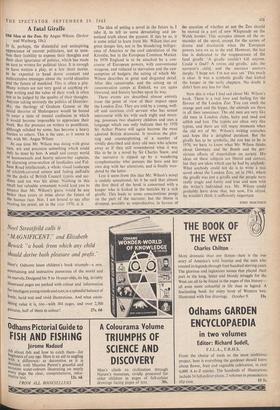A Fatal Giraffe
IT is, perhaps, the distasteful and uninspiring appearance of current politicians, not to men- tion their inability to express their thoughts and their clear ignorance of politics, which has made Us turn to writers for political ideas. It is enough to have written a play, or a few short stories, to be expected to hand down constant and authoritative messages about the world situation and the future of mankind. This is often a pity. Many writers are not very good at anything ex- cept writing and the value of their work is often not to be judged by the quality.of their thoughts Anyone taking seriously the politics of Dostoiev- sky, the theology of Graham Greene or the social theories of Shakespeare would be bound to enter a state of mental confusion in which it would become impossible to appreciate their Work. But the pressure on writers to pontificate, although relished by some, has become a heavy burden to others. This is the case, so it seems to ine, with Mr. Angus Wilson.
At one time Mr. Wilson was doing with great care, wit and precision something which could Only be done by him. A small and creepy world of homosexuals and hearty saloon-bar captains, an alarming cross-section of landladies and Ful- ham Road intellectuals, a whole visual landscape of oilcloth-covered settees and fading daffodils O n the desks of British Council typists and sar- dines and tea was his alcine. Nothing in this small but valuable armament would lead you to suspect that Mr. Wilson's guess would be any better than yours or mine about the future of the human race. Nor, I am bound to say after reading his novel, set in the year 1970, is it. The idea of setting a novel in the future is, I take it, to tell us some devastating and un- noticed truth about the present. If this be so, it is some relief to learn from Mr. Wilson that our great danger lies, not in the blundering belliger- ence of America or the cool calculation of the Kremlin, but in the European Common Market. In 1970 England is to be attacked by a con- course of European powers, with conventional weapons, and reduced to starvation and the con- sumption of badgers, the eating of which Mr. Wilson describes in great and disgusted detail. After this catastrophe, and the setting up of concentration camps at Enfield, we are again liberated, and history lurches upon its way.
These events are described almost entirely from the point of view of their impact upon the London Zoo. They are told by a young, well- off and uxorious civil servant who has sexual intercourse with his wife each night and morn- ing, possesses two shadowy children and uses a language which can only indicate that by 1970 Sir Arthur Pinero will again become the most admired British dramatist. It involves the plot- ting and counterplotting of a number of vividly described and dotty old men who scheme away as if they still remembered what it was like to be in a novel by Sir Charles Snow, and the narrative is zipped up by a wandering nymphomaniac who pursues the hero and her own dog with her attentions, and is finally mur- dered by the latter.
Lest it seem from this that Mr. Wilson's novel is unduly sensational, let it be said that almost the first third of the book is concerned with a keeper who is kicked in the testicles by a sick giraffe. This leads to some conscientious pangs on the part of the narrator, but the theme is dropped, possibly as unproductive, in favour of the question of whether or not the Zoo should be moved to a sort of new Whipsnade on the Welsh border. This occupies almost all the re- mainder of the novel, except for the scenes of drama and desolation when the European powers turn on us in the end. However, the last line is dedicated to the reappearance of the fatal giraffe. 'A giraffe couldn't kill anyone. Could it Dad? A rotten old giraffe,' asks the narrator's child, and the narrator answers deeply, 'I hope not. I'm not sure yet.' This much is clear. It was a symbolic giraffe that kicked the keeper in the early chapters. No doubt it didn't hurt any less for that.
Now this is what I find sad about Mr. Wilson's book. There is a real love and feeling for the flavour of the London Zoo. You can smell the orange peel and the hippo, the animals are there in all their innocence. The old men are very like old men in London clubs, hairy and mad and selfish and lost. The typists are often very like typists, and there are still many moments when the old wit of Mr. Wilson's writing screeches and hops like a delighted parakeet. But the giraffe has to be symbolic, the zoo has to be in 1970, we have to know what Mr. Wilson thinks about Germany and the Bomb and the per- nicious effects of materialism on society. His ideas on these subjects are liberal and correct, but they are ideas which can be had by anybody. What anybody could not do is to write a real novel about the London Zoo, set in 1961, where the giraffe was just a giraffe and the people were really tragic and funny and true and seen with the writer's individual eye. Mr. Wilson could probably have done that, but now, I'm afraid, he wouldn't think it sufficiently important.
JOHN MORTIMER






































 Previous page
Previous page